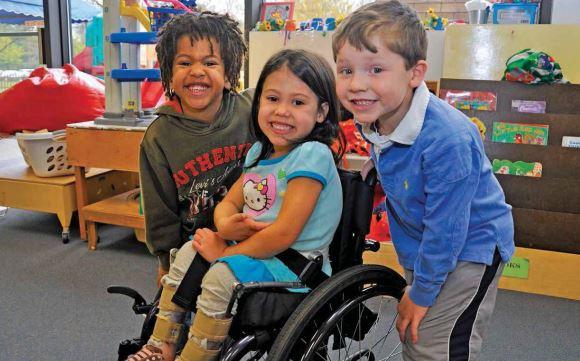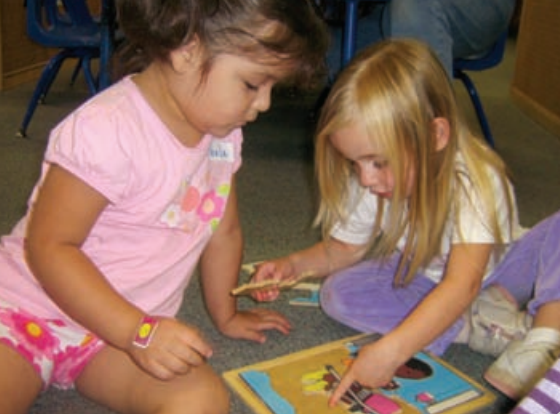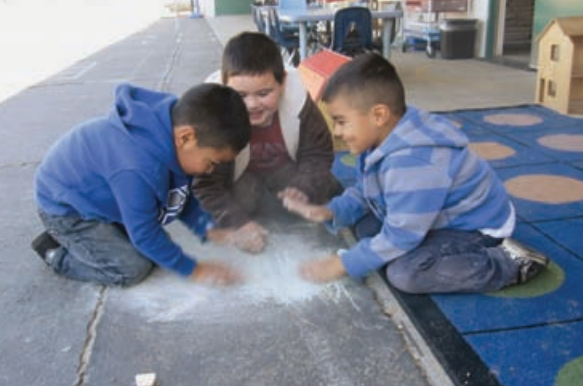15 3.2: How Children Develop Identity
During infancy we begin to recognize that we are a separate being. Then we begin to realize that this self is stable. Once this sense of self develops, we can formulate a categorical self. We become aware that even though we’re separate and distinct objects or entities or beings, we also exist in the world. We exist with other objects and beings and entities, in that, each of these objects has properties, including ourselves. In early childhood, these categories that children apply themselves to are very concrete. They include our developmental age, our gender, our size, and the skills we have. [31]
The Role of Early Childhood Education and Play
Where we truly start seeing social identities begin is within families and their culture. Where we see social identities cultivated, especially in the classroom is through play. Children develop self-identity, who they believe themselves to be, and begin to form relationships through play and peer relations which contribute to their emotional, social and cognitive development. Theories of self generally agree that an early childhood program can foster children’s self- esteem and build the foundation for future relationships with others.
Early childhood is a significant period for the children’s development including the emergence of their abilities and skills in areas such as language, physical development, psychosocial development, and cognitive development. This can be greatly influenced by the nature of the educational environment that the child is exposed to in the first years of life (Bowman, Donovan and Burns, 2001). Young children’s earliest years are the foundation for their physical and mental health, emotional security, cultural and personal identity, and developing competencies (United Nations Committee on the Rights of the Child, 2005, paragraph 6 (e)).
Another dynamic surrounds ‘personal’ versus ‘social’ identity. Personal identity refers to children’s subjective feelings about their distinctiveness from others, their sense of uniqueness, of individuality. Social identity refers, on the other hand, to the ways in which they feel they are (or would like to be) the same as others, typically through identification with family and/or peer culture (Schaffer, 2006). Factors like age, gender, religious background, ethnic background, interests, role models, talents, and hobbies play a part in a child’s emerging concept of self.

Relationships with Peers
As children develop their identity they are influenced by interactions and relationships with others. Woodhead (2008, p.6) highlights that identity has two distinct aspects –“ that of the unique individual person and that of the shared social person”. In addition, identity is expressed through children’s subjective feelings about themselves and about others.
Warin (2010) notes that identity does not exist outside the social context in which it is constructed and is something that the person carries about with them through time and through the range of social situations they participate in. This illustrates the educational importance of self-awareness and awareness of others.

Friendship is of value to children as they help each other understand the world in which they live. According to Dunn (2004), the quality of children’s friendships affects their development of a sense of personal and social identity. Children with friends have better social skills and fewer adjustment problems as friends provide social support and can protect against the difficulties of starting school, victimization and bullying (Dunn, 2004). Having friends is an important resource for developing identities.
Studies (George, 2007; Weller, 2007).have discussed the importance of friendship groups in relation to identity formation As Currie, D., Kelly, D. and Pomeramtz, S. (2007) note, membership of a group (or exclusion from it) can greatly inform the construction of ‘who you are’ in terms of identity- both in relation to one’s own self-identity and how others see you and how you see others. Children’s peer cultures work to influence and constrain the ways in which children construct meanings and values, act and communicate with each other; conduct aspects of identity in relation to themselves and their peers (Adler, P. Kless, S. and Adler, P., 1992).
Play
Play is crucial in Early Child Education (ECE) and families, caretakers, preschool teachers play a vital role in the early years of a child’s education. (Wood 2004). Children try to gain a sense of self and identity of their own when they associate with other people around them. During the early years of childhood (first 8 years) major development of brain occurs and lack of play activity based education can negatively impact on the child’s cognitive development during a crucial stage for identity development. Children develop self-identity and begin to form relationships. Play contributes to children’s emotional development and since play requires use of multiple motor and mental functions, children develop various skills as well. Play-based learning aids children in developing moral and social skills. [34]
There is accumulating scientific evidence of the potential of play and playfulness to enhance human capacity to respond to adversity and cope with the stressors of everyday life. In play, we build a repertoire of adaptive, flexible responses to unexpected events, in an environment separated from the real consequences of those events. Playfulness helps us maintain social and emotional equilibrium in times of rapid change and stress. Through play, we experience flow—A feeling of being taken to another place, out of time, where we have control of the environment.
Neuroscientific evidence of the significance of early experience not just to individual health, but also to the long term social and economic prosperity of society as a whole is driving a new public policy agenda in early childhood development. The evidence highlights the interconnectedness of physical, intellectual, social and emotional development, and of physical and mental health. There is powerful evidence about the impact of excessive stress and adversity in the early years on the incidence of a range of chronic diseases in adulthood , creating a new emphasis on the importance of social and emotional health in early childhood and growing public policy interest in early intervention with children living in families coping with the stresses of poverty, violence, mental illness, and substance abuse. Early childhood is on the public policy agenda, and the environments where children spend time in their pre-school years are under intense scrutiny.

For the child, play and playing is fundamentally about agency, power, and control. In play, children actively explore their own social and physical power, in relationship to the world, and to other children. As each child participates with other children in the social contexts of play, exploring and testing and making decisions at the edges of their own possibility, they come to understand what it means to be in control, and what it means to be out of control. When left to control their own play, they explore what it means to exert their own power over others, and take chances and physical risks. The risks that they take, are calculated risks that can be supported by early childhood professionals, who understand the need for risk-taking. It is worthy of note that the notions of participation and control are deeply embedded in the language of health promotion. Active participation in community and in particular in the decisions that affect us contributes to a sense of control over the multiple factors that influence not just our physical and mental health, but also our subjective sense of well-being and belonging.
Play has the potential to contribute to social and emotional health in early childhood, which supports the idea that the power of play to make us resilient, flexible, and strong—emotionally, socially, physically, intellectually, and perhaps spiritually—may lie in its propensity to invert and subvert the order of things. Spontaneous play may provide critical opportunities for children to experience a sense of social belonging, well-being and participation in the culture of childhood, as well as to develop social and emotional awareness, control and resilience. Play helps children learn to “roll with the punches” of everyday life, and to experience the ongoing social and emotional balancing of self that is fundamental to successful participation in social life. [36]
|
|
Think About It… How are resilience, social belonging, and social and emotional awareness related to diversity and equity? |


